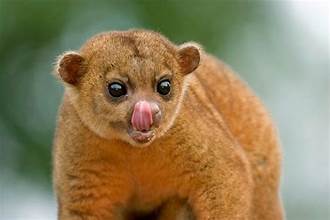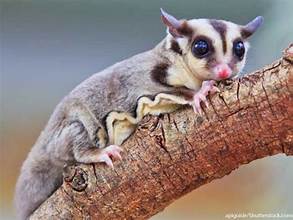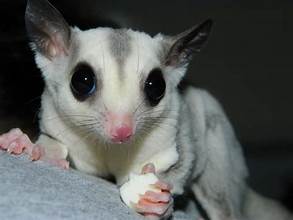Kinkajous are fascinating exotic pets known for their playful personalities and nocturnal nature. Also called “honey bears,” these small rainforest mammals require specialized care to thrive in captivity. If you’re considering adopting a kinkajou, understanding their nocturnal habits, diet, and handling is crucial. This comprehensive guide will help you provide the best care for your kinkajou.
Nocturnal Habits of Kinkajous
Kinkajous are strictly nocturnal, meaning they are most active at night and sleep during the day. Their natural behaviors include:
- High Activity Levels at Night –
Expect climbing, playing, and exploring after dusk.
- Sleeping During the Day –
They need a quiet, dark area to rest without disturbances.
- Loud Vocalizations –
Kinkajous communicate using chirps, barks, and high-pitched calls, especially at night.
- Strong Climbing Instincts –
With prehensile tails and sharp claws, they love to climb and require a habitat that allows for vertical movement.
Kinkajou Diet: What Do They Eat?
A balanced diet is essential to keep your kinkajou healthy. They consume various fruits, nectar, and small insects in the wild. In captivity, their diet should include:
Primary Food Sources
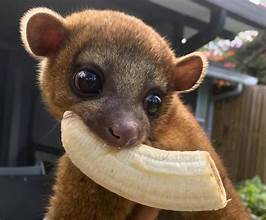
- Fruits (75-85% of diet):
- Mangoes, bananas, papayas, melons, grapes, apples, and pears.
- Vegetables (10-15%):
Sweet potatoes, carrots, leafy greens, and bell peppers.
- Protein (5-10%):
Cooked eggs, mealworms, small amounts of chicken.
- Commercial Exotic Pet Diets:
Some high-quality primate or exotic pet foods can supplement their diet.
Foods to Avoid
- Avocado –
Toxic to kinkajous.
- Chocolate & Caffeine –
It can cause severe health issues.
- Onions & Garlic –
Harmful to their digestive system.
- Citrus Fruits –
It may cause stomach upset.
- High-Sugar or Processed Foods –
Unnatural and unhealthy for their metabolism.
Handling and Socializing a Kinkajou
Kinkajous are intelligent and curious but can also be unpredictable. Proper handling and socialization are necessary for a well-adjusted pet.
Tips for Handling Your Kinkajou
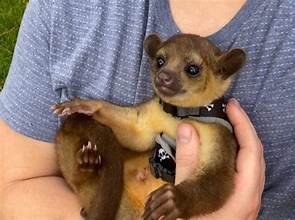
- Start Young –
Socializing kinkajous from an early age improves their temperament.
- Use Positive Reinforcement –
Treats and gentle handling help build trust.
- Avoid Sudden Movements –
Quick gestures can startle them, leading to defensive biting.
- Provide Enrichment –
Toys, climbing structures, and puzzles keep them mentally stimulated.
- Respect Their Nocturnal Schedule –
Waking them during the day can lead to stress and aggression.
Common Health Issues in Kinkajous
Kinkajous can suffer from various health issues if not cared for properly:
- Obesity –
Too much fruit or lack of exercise can lead to weight gain.
- Dental Problems –
High-sugar diets can cause tooth decay.
- Respiratory Infections –
Common in poor living conditions with improper humidity levels.
- Parasitic Infections –
Regular vet checkups are necessary to prevent internal and external parasites.
Is a Kinkajou the Right Pet for You?
Owning a kinkajou is a long-term commitment. They live up to 25 years in captivity and require a specialized diet, a large enclosure, and plenty of social interaction. They are best suited for experienced exotic pet owners who can handle their nocturnal nature and active lifestyle.
Final Thoughts
Caring for a kinkajou requires patience, knowledge, and dedication. Their nocturnal habits, diet, and handling needs must be met to ensure a happy, healthy life. If you’re ready for the responsibility, a kinkajou can be a fascinating and loving companion.
Explore our blog for more exotic pet care tips and stay informed about the best practices for keeping your unique pet healthy!

